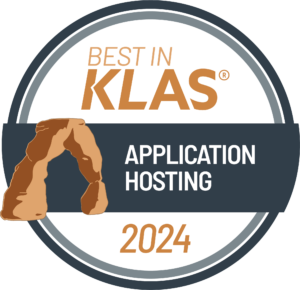
Improving Stability and Alignment with MEDITECH Expanse
Case Study
For Tegria and everything they did for us, I’ll do anything I can to help them.”
Keith Willey, CIO, Val Verde Regional Medical Center
In 2019, Val Verde RMC appointed a new Chief Information Officer (CIO) and made significant changes in their senior leadership team. Accompanying these changes, the new administration decided to take information technology (IT) services back in-house after years of off-site outsourcing and switch their electronic health record (EHR) provider. In late 2019 VVRMC made plans to implement their new MEDITECH Expanse EHR in February 2020. It soon became apparent they did not have sufficient internal resources, personnel, or expertise to successfully execute the implementation in an on-premises environment, so they began looking for a remote hosting partner for their upcoming implementation.
 VVRMC decided to partner with Tegria for remote hosting using Tegria’s cloud environment. As with any implementation strategy, there was a wide range of experiences and knowledge levels to manage throughout the process. In some cases, there was significant resistance to change, with many end-users raising concerns about the location of data and the speed at which it could be accessed from the remote environment. Education was imperative in establishing a common understanding of the EHR hosting model and managing individual expectations.
VVRMC decided to partner with Tegria for remote hosting using Tegria’s cloud environment. As with any implementation strategy, there was a wide range of experiences and knowledge levels to manage throughout the process. In some cases, there was significant resistance to change, with many end-users raising concerns about the location of data and the speed at which it could be accessed from the remote environment. Education was imperative in establishing a common understanding of the EHR hosting model and managing individual expectations.
Shortly after going live in February, the impact of COVID-19 was being felt across the country. Only one month into the three-month EHR optimization period, VVRMC had to reassign hospital rooms and COVID-19 isolation units, changing the billing for those rooms on the fly. By July, the Del Rio region of Texas had a 54% weekly positivity rate for COVID-19. It was clear that VVRMC was in a period of significant disruption – both planned and unforeseen – and had to act quickly.
VVRMC made the decision to significantly accelerate technological adoption and implementation plans. Together, VVRMC and Tegria were able to launch both telehealth visits and point-of-care solutions in only 30 days instead of two years and 12 months, respectively. Tegria effectively leveraged their relationships to allow those implementations to happen quickly and easily. The implementation of point-of-care devices was particularly well-received by the nurses, who say they make the day-to-day work at VVRMC significantly easier. With successful data storage and management, VVRMC is beginning to see the financial benefits of the device implementation. By mid 2021, VVRMC expects to have recovered the full cost of implementation and begin seeing financial gains from the addition of point-of-care devices.
Another decision VVRMC made in response to COVID-19 was to implement remote patient monitoring (RPM). Thirty days later they were up and running, offering RPM for all departments. This implementation was critical for the community’s immediate needs and as COVID-19 continued to spike across the country, VVRMC could move from simply playing reactive defense to executing a more strategic, offensive plan. For example, doctors were able to monitor patients at home using a variety of devices and identify adverse events without sending them to the hospital. VVRMC is currently exploring additional opportunities to improve the patient experience, including virtual on-demand care.
Tegria’s ability to focus on creating strategic partnerships allowed the relationship with VVRMC to thrive. Collaboration was key during the initial implementation and support of VVRMC’s EHR environment. The ability to adapt to this year’s volatility by brainstorming and implementing solutions together is what makes this partnership stand out. Throughout the project, it was imperative that VVRMC and Tegria’s relationship remain flexible, responsive, and able to adapt to changing business environments.
Tegria excelled in:
As additional hurdles presented themselves to VVRMC, Tegria was only a phone call away, willing to do whatever needed to be done to help VVRMC succeed.
Since upgrading their EHR with Tegria, VVRMC’s health data is stored securely and is rapidly accessible in Tegria’s cloud environment – far quicker than it was previously. The addition of two-factor authentication for off-site care team members allows for swift, secure access through a web browser, whereas previous software took much longer and caused frustration.
Almost two years into VVRMC’s implementation timeline, there have been zero disappointments or missed deadlines. “Things have gone so smoothly that our team has joked about how much divine intervention there must have been to implement the project’s initial scope and accelerate and adopt new technologies,” said Keith Willey, CIO at VVRMC. While there may have been some luck involved, there was far more skill. The talent, attitudes and relationships created and developed throughout this engagement led to flexible, value-based solutions. VVRMC and Tegria continue to partner on opportunities and have become a case study example for other hospitals and health systems.
Finally, VVRMC feels more secure now that they have a cloud-hosted EHR. Without having to rely on someone with that specific knowledge in-house, VVRMC is able to lean on Tegria for unmatched service and a personal relationship that transcends their contract and helps them navigate the COVID-19 pandemic.
As Willey puts it, “I tell all my vendors, if you do well for my organization, if you do well for my staff, I will sing your praises, five-star reviews and so on. I will also let people know if you harm my hospital or cause extra work for my staff. For Tegria and everything they did for us, I’ll do anything I can to help them.”
Learn more